What the heck is relationship anxiety?
Have you ever met someone and felt butterflies? That light, fluttery feeling that makes you believe in magic for a minute? And then—suddenly—those butterflies become knots in your stomach, the second things get too real?
That moment when closeness triggers panic instead of comfort. Yeah, that’s relationship anxiety.
It’s more common than we think, and it doesn’t mean you’re broken—it just means you’re human and probably a little bruised.
What is Relationship Anxiety?
It’s a type of anxiety that shows up specifically when you’re in (or trying to be in) a relationship. Most often, it hits in romantic relationships, but it can also pop up with friends and family.
It’s that constant, nagging feeling of not being good enough, of waiting for the other shoe to drop, of questioning how the other person feels—and whether you’re even worthy of their love in the first place.
In this article, I want to walk you through the causes of relationship anxiety, the red-flag signs of relationship anxiety that might feel a little too familiar, and the steps we can take to begin healing and even overcome relationship anxiety.
I’m not a therapist or a couples counselor—but I am someone who’s been through the wringer more than a few times. I’ve lived this cycle repeatedly: the excitement, the spiraling, the fear, the sabotage, the heartbreak.
I’ve analyzed text messages like crime scenes, cried over silence, and pushed people away before they had a chance to choose me, or not choose me.
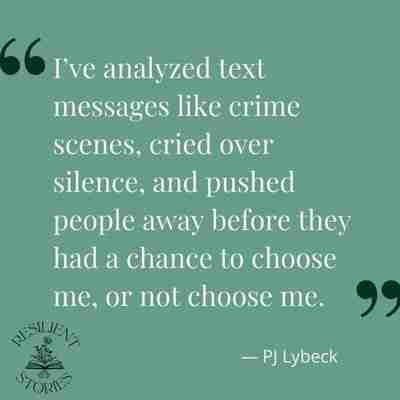
For almost seven years, I’ve stayed single, not because I haven’t met anyone, but because my anxiety has created roadblocks I didn’t know how to navigate.
I’ve been the girl who needed constant reassurance. I’ve been the woman who self-sabotaged something good because deep down I didn’t believe I deserved it. And I’ve also been the version of myself who hurt someone I cared about just to feel seen in my pain.
So no, I’m not coming at this from a clinical perspective—but I am coming at it from a deeply personal one.
And if any part of this story sounds like yours, I hope you’ll find some clarity, hope, and maybe even a little peace in knowing you’re not alone.
What Relationship Anxiety Feels Like
Relationship anxiety isn’t just butterflies before a date or feeling off after a disagreement.
It goes much deeper than that.
It’s the emotional landmine that gets triggered when love, vulnerability, or intimacy starts to feel real.
It’s the fear of being abandoned.
That fear of getting close to someone only to be left behind once they see the “real” you.
It’s the paralyzing belief that you’re either too much—too emotional, too intense, too complicated-or not enough—not attractive enough, smart enough, successful enough, worthy enough to keep them interested.
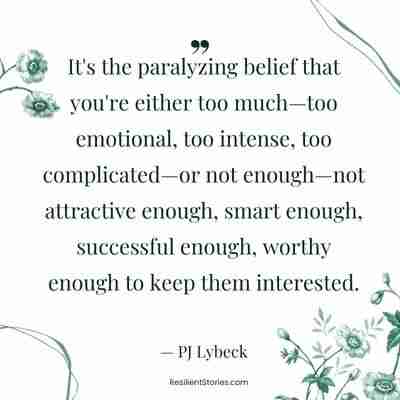
It shows up in the quiet moments. The ones when your brain starts spinning stories after a text goes unanswered. It makes you reread messages for hidden meanings, questioning tone, emojis, or even punctuation. It turns compliments into puzzles.
Instead of accepting kind words at face value, you wonder: Are they just being polite? Are they trying to soften the blow before they leave?
Relationship anxiety whispers that affection is temporary.
That people are only with you until something better comes along. It convinces you that if someone pulls away even slightly, they’re already halfway out the door.
And sometimes, the anxiety gets so loud, you push them away before they get the chance to do it themselves, just to avoid the hurt you believe is inevitable.
Unlike general anxiety, which can be broad, situational, or related to work, health, or daily stress, relationship anxiety shows up specifically in emotional connections.
It gets activated when closeness forms, when vulnerability is required, or when someone starts to feel safe… because deep down, safety feels foreign.
For those of us who grew up with inconsistent love, neglect, or betrayal, intimacy doesn’t always feel safe—it feels risky. Scary. Like walking a tightrope with no net.

Relationship Anxiety is Not Just Limited to Romantic Relationships
And while we often talk about relationship anxiety in the context of romantic relationships, it doesn’t stop there.
It can creep into friendships, making you feel like you’re always the one who cares more, or like you’re a burden. It can show up in family dynamics, especially when boundaries are blurred or love was conditional growing up.
You will discover it can even bleed into work relationships, where the fear of being misunderstood, rejected, or “not good enough” keeps you from speaking up or building connections.
Relationship anxiety isn’t one-size-fits-all. It wears different masks for each person. For some, it’s clinginess and the desperate need for constant reassurance.
For others, it’s emotional shutdown, walls, and silence. Either way, the root is the same: a fear that love will leave you. A belief that you aren’t enough—or that if someone gets too close, they’ll see the parts of you that you’ve worked so hard to hide, and they’ll walk away.
Understanding that fear is the first step to healing it. You’re not “too much.” You’re not “broken.” You’ve just been wounded where love lives—and healing in that space takes time, patience, and a whole lot of self-compassion.
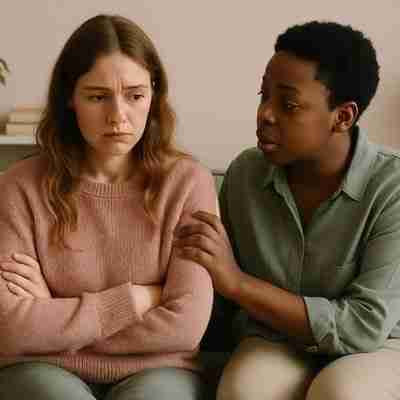
Where Does It Come From?
It’s not random, and it’s not your fault.
Relationship anxiety often grows from the cracks left by old wounds and experiences that taught us love isn’t safe. These roots run deep:
- Past experiences — Betrayal, neglect, abuse, or abandonment from earlier relationships (romantic or familial) can shape your understanding of emotional safety.
- Attachment style — People with an anxious attachment style often feel overwhelmed by constant doubt and the fear of a partner leaving. If you weren’t taught how to feel safe in intimate relationships, you may struggle in the present.
- Low self-esteem and low self-worth — If you don’t believe you’re lovable or enough, it’s hard to believe others could truly want you.
- Neurodivergence and mental health conditions — High-functioning anxiety, anxiety disorders, or other mental health issues can amplify the need for control, reassurance, or validation.
- Unresolved personal issues — Old pain that hasn’t been addressed can seep into new love, distorting your reactions and causing relationship insecurity.
- Cultural messaging – Society pushes perfection, timelines, and unrealistic expectations around relationships.
You’re not alone if you experience relationship anxiety from any of the above. Understanding your attachment style and what triggers your feeling anxious is a brave, foundational step toward healing.
What It Looks Like: The Signs of Relationship Anxiety
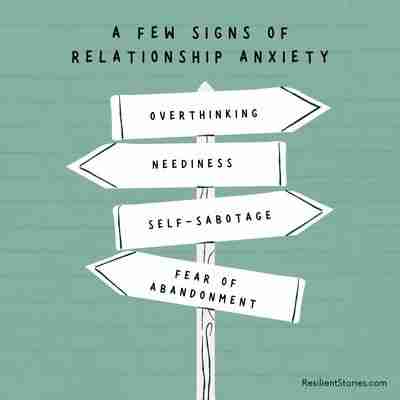
Signs of relationship anxiety vary by person, but here are some of the most common patterns I—and many others—know all too well:
- Constantly questioning your worth in the relationship, even when things seem fine.
- Needing constant reassurance to feel secure.
- Becoming overly fixated on your partner’s feelings, trying to read between the lines.
- Overthinking every message, emoji, or silence—thanks to those lovely intrusive thoughts.
- Avoiding vulnerability because you’re afraid it’ll scare the other person off.
- Sabotaging something good out of fear that it’s too good to be true.
- Experiencing physical symptoms like a racing heart, rapid heartbeat, or upset stomach when your partner pulls away.
- Feeling waves of persistent worry that you’ll be left behind.
If any of this sounds like you… Welcome to the club. You are not alone.
These aren’t just quirks. They’re symptoms of deeper emotional patterns, and they can have a significant impact on your well-being and relationship satisfaction.
The Toll It Takes When Trying to Have a Healthy Relationship
Relationship anxiety doesn’t just live in your thoughts—it shows up in your body, your behaviors, and your relationships.
On You:
Living in a constant state of worry is exhausting. You second-guess everything, even the moments that should feel good.
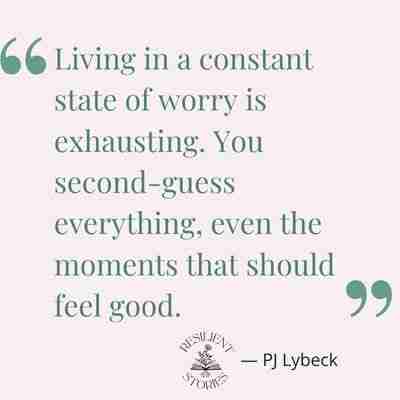
It can create negative thought patterns that cause burnout in your emotional life and affect your daily life outside of the relationship.
You’re always preparing for something to go wrong, and that fear gets in the way of being in the present moment.
On Your Partner:
The other partner may feel like they’re walking on eggshells. Your panic becomes their guilt. Your silence becomes their shame.
This imbalance can create emotional distance, resentment, and eventually poor communication.
When one partner is constantly trying to prove their love, while the other partner is trying to control the fear of abandonment, no one wins.
Your partner’s anxiety may then start to show, which can become an unhealthy cycle for you both.
How to Heal & Move Forward
If you want to overcome relationship anxiety, the first step is deciding that you want something different.
Here’s how to start:
Start with reflection. Track your anxious thoughts. Identify triggers. Journal. Talk to a friend. Read. Seek professional help if needed.
Be brave enough to name the patterns—and compassionate enough not to shame yourself for having them.
You can’t fix what you don’t name. Journaling helps many. Therapy helped me.
Start noticing the pattern: “What triggered this panic?” “Is this fear based on fact or past trauma?”
Name it, don’t shame it.
Practice honest conversations. Let your partner know what’s going on, without blame or manipulation.
Express your feelings clearly: “When you’re quiet, my anxiety makes me feel like you’re pulling away. I know that’s my fear; it’s not your fault.” Clear is kind.
Secure love feels boring at first, that’s because it is safe. Healing means learning how to feel secure—with or without your partner’s reassurance.
Start to replace your fear with trust.
Learn what a secure attachment style feels like. Study love languages. Set boundaries rooted in love, not fear. Let your partner meet you in that safe space.
Tools & Strategies for Coping With Relationship Anxiety Disorder
Healing is messy. Growth isn’t linear. But every time you pause instead of panic, every time you breathe instead of blame, you’re doing the work.
- Differentiate between boundaries and emotional walls.
- Practice mindfulness to stay in the present moment and manage stress.
- Use affirmations: “I am worthy of love without earning it.”
- Try couples therapy to build understanding between you and your significant other.
- Reframe negative thinking into a positive mindset.
- Surround yourself with people who offer consistent emotional support and who bring joy.
- Do inner child work: speak to that version of you who was hurt and scared and let them know they’re safe now.
My Story: When I Let Anxiety Drive the Bus
Relationship anxiety hasn’t just shown up in my romantic life—it’s been there in my friendships, family dynamics, and even my career.
It wears different faces depending on the context, but the root of it has always been the same: fear. Fear of being too much.
The fear of not being enough. Fear of disappointing people. The fear of being left out, forgotten, or worse—unloved.
With friends and family, relationship anxiety showed up in smaller, quieter ways. I used to be terrified of saying “no.” Saying, “That doesn’t work for me” or “I’m not comfortable with that” felt like I was risking love, connection, or approval.
I thought if I set boundaries, they’d be mad at me—or worse, they’d walk away. I was constantly worried that I’d be in trouble, even as a grown adult. And in my twenties, I had a brutal case of FOMO (fear of missing out).
If I weren’t invited, I’d spiral, convinced it was personal. That I wasn’t liked. That I wasn’t good enough.
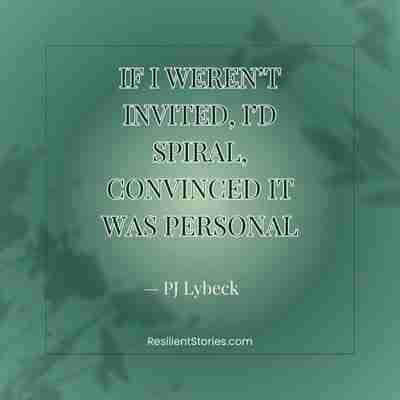
Now? I’m honestly relieved when I’m not invited. I’ve learned to appreciate my peace and recognize that being excluded isn’t always rejection—it’s just redirection.
I’ve developed stronger boundaries, and I’m learning that saying no doesn’t make me selfish. It makes me self-aware.
Developing a Healthy Relationship With Myself
It wasn’t until my 30s that I finally started setting boundaries at work, too, especially as a special education teacher.
In this role, you wear a hundred hats: lesson planner, behavior strategist, paper-pusher, emotional support human, and mentor—not just to students, but to paraprofessionals and colleagues.
I gave it everything. And for a while, it felt noble… until it felt like burnout.
I was in my late 30s before I finally stood up and said, “This isn’t sustainable.” My mental health was spiraling.
My kids were getting the leftovers of my energy, and I was sacrificing my personal life for a job that had no finish line. I thought people would be mad and the school would fall apart if I weren’t constantly over-performing.
I thought saying no would mean letting my students down—or worse, being seen as weak. But that wasn’t just general anxiety.
That was relationship anxiety, too—this deep-seated fear that if I didn’t do everything for everyone, I wouldn’t be valued or needed. I’ve since learned how deeply this connects with my attachment style—an anxious avoidant mix that pulls me between needing closeness and fearing it.
Attachment Anxiety and Relationship Problems
Then there’s my dating life—if you can even call it that.
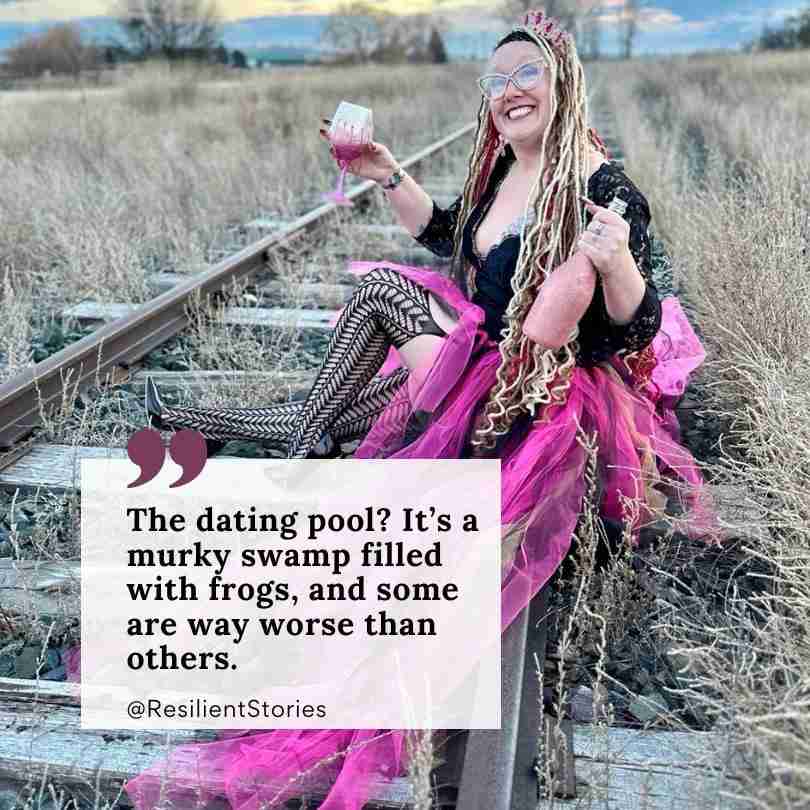
I’ve been single for nearly seven years now. That doesn’t include the long list of situationships—those almost-things that never became a thing. And if I’m being really honest, I’ve self-sabotaged nearly every one of them.
I now recognize many of these patterns as signs of relationship anxiety that I didn’t yet know how to name.
Dating someone new? If they don’t text back right away, my brain goes straight into overdrive. They’re done. They found someone better. I said too much. I’m too much.
My mind doesn’t leave room for grace or logic—it jumps straight into panic. My chest tightens, my thoughts race, and I spiral into worst-case scenarios before the person even has a chance to respond. These are real physical symptoms of anxiety that I didn’t realize were connected to my mental health.
So what do I do?
I shut down and overreact, pushing them away before they can push me first. I tell myself it’s safer this way—easier to be alone than to feel that kind of rejection.
But really?
It’s just loneliness dressed up in control.
This is the painful cycle many of us face when we experience relationship anxiety, especially when paired with unresolved trauma or unresolved issues from past relationships.
And sometimes, I’ve done worse.
When Fear Feels Like Fact: Unpacking Negative Thoughts and Relationship Anxiety
I’ve hurt people because I wanted them to feel something. Feel my pain. I’ve weaponized my words, crossed boundaries, and tried to force emotions where there weren’t any, just so I didn’t have to sit with my sadness. I knew it was petty.
But my anxiety wanted validation. I wanted to be seen, even if it meant being seen as messy or emotional or dramatic. I’ve even found myself picking fights just to test whether someone would leave.
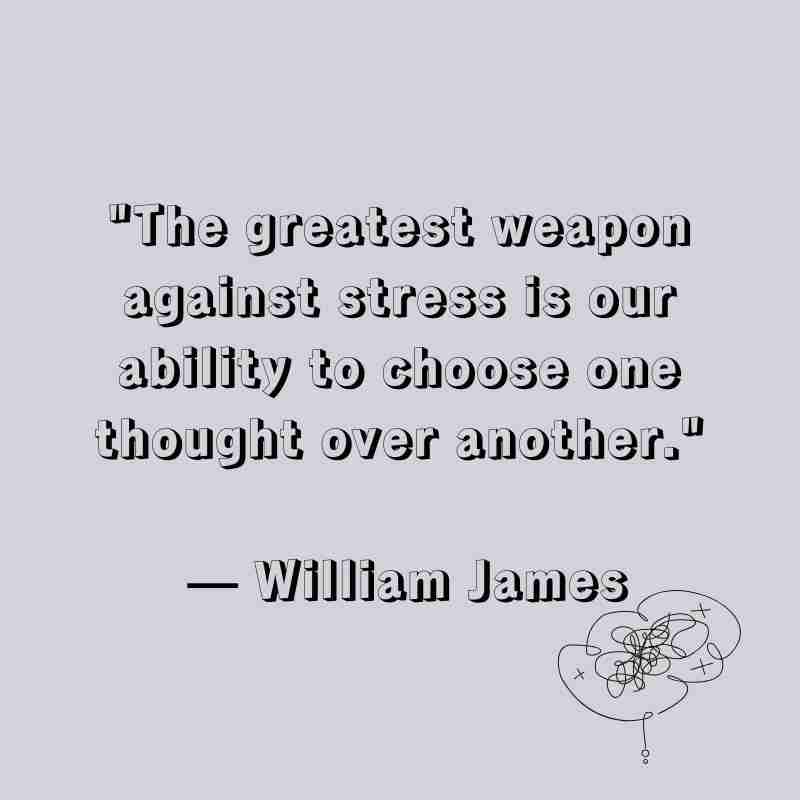
The hardest truth? Just because someone doesn’t feel the same way about me doesn’t mean I get to control the outcome. That’s relationship anxiety. It doesn’t just make you afraid—it makes you reactive, defensive, and sometimes even cruel.
And all the while, you’re just trying to be loved. I’ve also come to understand that sometimes my fear is worsened by external factors—their unavailability, my own partner’s anxiety, or the pace at which we’re spending time together.
Healing for me has meant taking responsibility for that. Sitting with the discomfort instead of acting on it. Learning to trust myself again so I can eventually trust someone else.
It means unpacking my patterns and naming them for what they are, without judgment. It means recognizing that when I feel unworthy or fall into constant questioning, I’m not broken—I’m healing.
I still have hard days. I still scroll through social media and feel the sting when I see friends getting engaged, going on trips with their partners, or building the life I’ve only dreamed of.
Being the “rare single friend” sometimes feels like a neon sign flashing unlovable across my chest.
You Are Not Unlovable: Rebuild Your Self-Esteem
But I also know this: I’m a badass, eccentric, neurodivergent weirdo with a massive heart, and somewhere out there is someone just weird enough to love me exactly as I am. I don’t need to perform or pretend or panic my way into love.
I just need to keep healing, one boundary, one truth, and one deep breath at a time.
If you recognize yourself in any of this, please know: You are not broken. You are not unlovable.
Relationship anxiety isn’t the end of your story—it’s just a chapter. With awareness, tools, and time, you can build something real.
Let yourself grow into the version of you that believes in love again—starting with loving yourself.
Healing takes time, but so does building a love that lasts.


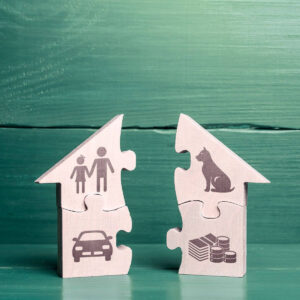



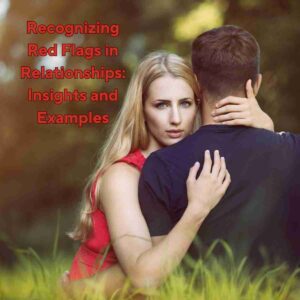




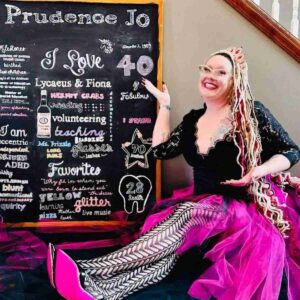




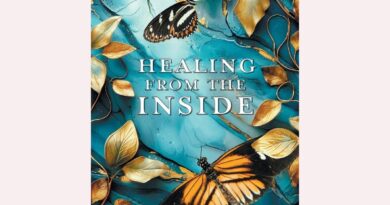
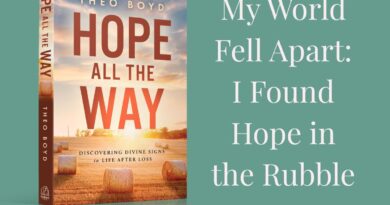
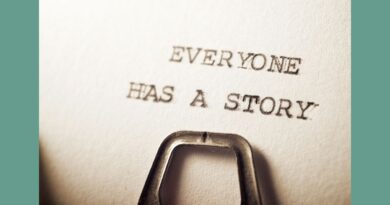










0 Comments